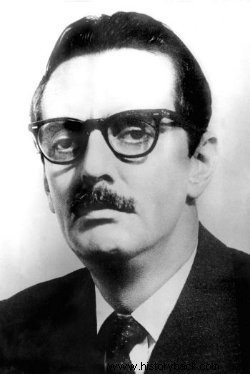Jânio Quadros he was a politician and the 22nd president of Brazil from January 31, 1961 to August 25, 1961. He succeeded Juscelino Kubitschek (1902-1976). In addition, he was a teacher and lawyer.
Biography of Jânio Quadros
Jânio da Silva Quadros was born in Campo Grande, capital of Mato Grosso do Sul, on January 25, 1917.
He attended primary education in Curitiba, capital of Paraná, at the “Grupo Escolar Conselheiro Ezequiel da Silva Romero Bastos” and at the “State College of Paraná”, until 1930. Shortly afterwards, he moved to São Paulo and attended the “Arquidiocesan Marist College of São Paulo”. Paul.”
In 1943, he graduated in Law from the University of São Paulo. He then taught geography and Portuguese classes at Colégio Dante Alighieri, Colégio Vera Cruz and Universidade Presbiteriana Mackenzie.
He began his political career by becoming a councilor, and later, mayor, governor and federal deputy for the state of São Paulo.
These positions were essential to gain popularity among the people of São Paulo and, later, to assume the position of President of the Republic.
He married Eloá Quadros in 1942 and had a daughter Dirce Maria Quadros who followed a political career. She was a federal deputy for the PSDB from 1987 to 1991.
He died in São Paulo on February 16, 1992, aged 75.
The Government of Jânio Quadros
Jânio Quadros ascended to the presidency of the Brazilian government in 1961, elected with 5.6 million votes and supported by the UDN (National Democratic Union). This party was center-right and allied with US policies. His political opponent was Marshal Henrique Teixeira Lott (1894-1984).
With his vice-president João Goulart (1918-1976), from the PTB, he formed the plate called “Jan-Jan ”.
The Brazilian scenario was one of crisis, as the government of Juscelino Kubitschek (1956-1960) left the country with an unstructured economy, inflation and a higher external debt.
To contain these problems, Quadros froze wages, devalued the national currency and restricted access to credit funds, in an attempt to balance the economy.
As for the external scenario, the world was experiencing the Cold War (led by the two world superpowers, the US, capitalist, and the USSR, socialist). In this way, Jânio remained in a neutral position and, many times, being pragmatic and privileging economic interests.
Despite being considered conservative and anti-communist, this position was not reflected in Jânio Quadros' foreign policy. He approached socialist nations like Cuba, China and the USSR.
In 1961, he participated in the delivery of the “Grã-Cruz do Cruzeiro do Sul”, the highest decoration of the Brazilian government to Che Guevara (1928-1967), leader of the socialist movement in Latin America. This gesture provoked criticism from the Brazilian right.
He was a charismatic leader of the masses, trying to get closer to the people by wearing dark suits, on which he dropped dandruff in order to look more popular.
Although he had a certain authoritarian inclination, Jânio helped in the consolidation of the democratic regime in the country, attacking the elite several times, in defense of the popular layers.
Along these lines, his actions were somewhat controversial like:
- prohibition of wearing bikinis on beaches
- suspension of cockfights
- prohibition on the use of perfume launchers
This demonstrated fragility in the goals of the proposed political plan, thus alienating the population and, over time, the president lost his popularity.
Jânio Quadros' Resignation
Indeed, after losing support from the military and under pressure from Carlos Lacerda (1914-1977), leader of the UDN, Jânio resigned on August 25, 1961.

His presidential term was one of the shortest (almost seven months) in the history of the country's presidency. The position was later assumed by the vice president:João Goulart.
In a letter to the National Congress, Jânio Quadros declared the pressure he was suffering from “terrible forces”, a determining factor to justify his resignation.
Below are some excerpts from the Letter:
Quotes by Jânio Quadros
- “I drink it because it is liquid, if it were solid I would eat it .”
- “The PMDB is an ark of Noah, without Noah and without the ark .”
- “Intimacy breeds annoyances or children. Since I don't want any trouble with you, let alone children, call me Sir .”
- “I learned in the cradle with my mother, that there is no man half honest and half dishonest. Either they are entirely honest or they are not .”
- “Inflation dissolves money, debases treasuries, compromises credit, disrupts production, paralyzes works, drains governments, depletes individuals, ferments revolutions .”
- “In this country, millions and millions of men work, work for a few to eat, eat .
Curiosity
- The broom was the symbol of Jânio Quadros' presidential campaign, as he intended to “sweep up” the country's corruption. The jingle “sweep, sweep broom/sweep the swag ” became a hit at the time.
- With the return of democracy, in 1985 Jânio Quadros was elected mayor of São Paulo, defeating the then senator Fernando Henrique Cardoso.
Read more about Goal Plan.
